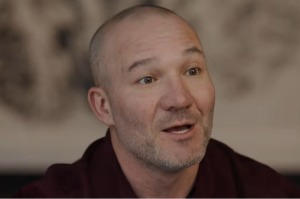Where Is God in Our Suffering? Tullian Tchividjian's 'Glorious Ruin' Offers New Perspective
William Graham Tullian Tchividjian, the grandson of evangelist Billy Graham, has a new book out that takes a look at one of the deepest questions people have asked themselves – why is there suffering? His book Glorious Ruin suggests, however, that besides asking "how" and the "why", looking at the "who" is also a fundamental aspect to consider when it comes to suffering.
Tchividjian, who is a senior pastor at Coral Ridge Presbyterian Church in Ft. Lauderdale, Fla., and a professor of theology at Reformed Theological Seminary in Orlando, has written several books exploring Christian issues in today's world.
Glorious Ruin argues that even though people crave for answers and explanations at times of suffering, it is God's presence and reaching out to Him that ultimately can set them free. The best-selling author proposes that the Gospel is not ultimately about being protected from pain, but about taking refuge in God throughout this pain.
Below is The Christian Post's email interview with Tchividjian about Glorious Ruin.
CP: There are a lot of books on suffering. Why write another one?
Tchividjian: When I set out to write this book, I did my research on suffering books – both Christian and non-Christian. And what I discovered was that there are a lot of books written on the Why of suffering and also a lot of books written on the How of suffering. But very few written on the Who of suffering.
The Why books attempt to explain why a good and sovereign God allows pain. If God is both good and in total control, then why is there evil and suffering and heartache in this world? And while much smarter people than me have constructed elaborate systems in pursuit of this answer – the fancy word for such a theory is theodicy – they are all by definition exercises in speculation. To know the Why would be to grasp the mind of God, which is something none of us can do.
We also have a lot of books tackling the How. That is, how suffering can and will transform our lives, how we can leverage pain and tragedy to make us better people. Results, results, results! Underneath this hopeful veneer, such philosophies tend to fall flat when things don't go according to plan, when we find out that our power, especially in the face of suffering, is a lot more limited than we thought. Pain would not be pain if we could harness it for personal gain, though the tendency to attempt to do so is a universal one.
This is not to say that How and Why are not honest questions. Of course they are! And Glorious Ruin explores a few common attempts to answer them. But How and Why can also be a prison. They can leave us cold and confused, just as they left Job cold and confused when his friends tried to formulate their own tedious answers.
The question I emphasize instead-and the only one that will ultimately point us toward the truth-is the Who amid our suffering. Which is the only question that God has seen fit to answer, concretely, in the person and work of Jesus Christ.
But let me say one more thing. In one sense, this is not a book on suffering in the way that we typically think about suffering. When most of us think about suffering we think of death, disease depression – you know, the "big" stuff, crises. I wanted to broaden the scope and talk about suffering in terms of living life in a broken world as a broken person with other broken people. It's really a book about how the gospel intersects with real life – not only the big problems we face but also the seemingly mundane, everyday stuff like frustration, disappointment, anxiety, stress, and sadness. My ongoing struggle with me, others, God, circumstances. Relational strain, the feeling of being misunderstood, cheated-it's all suffering. My goal was to describe suffering in such a way that every single reader - healthy or unhealthy, rich or poor - could say, "You just described my reality." In my experience, the most direct route to the gospel is down the avenue of pain and brokenness.
CP: When one experiences intense pain, he can't help asking "Why?" Why do you think is so?
Tchividjian: It's totally natural to ask "why" when we are going through the crucible of ache. Why me? Why now? Why him? Why her? Why this? But what I've discovered in my own life is that asking why assumes that information has the power to heal. If I just knew why suffering was happening, we conclude, then the pain would be easier to endure. What I've learned, however, is that information cannot mend a wounded heart. We see this in the story of Job. Even if God had told Job why he was suffering, Job would still have had to deal with the loss of his health and family and wealth.
The truth is, we may never fully understand why God allows the suffering that devastates our lives. We may not ever find the right answers to how we'll dig ourselves out. There may not be any silver lining, especially not in the ways we would like. But we don't need answers as much as we need God's presence in and through the suffering itself. The truth is that when it comes to suffering, if we do not go to our graves in confusion we will not go to our graves trusting. Explanations are often a substitute for trust.
For the life of the believer, one thing is beautifully and abundantly true: God's chief concern in your suffering is to be with you and be Himself for you. And in the end, what we discover is that this really is enough.
CP: If God is using suffering to guide Christians, what can be said about the suffering of non-believers?
Tchividjian: Whether it's a Christian or a non-Christian, there's nothing like suffering to show us how small, needy, and not in control we are. Suffering has a way of sobering us up to the realization that we can't make it on our own, that we need help, that we're broken. It paves the way for us to see that we are deficient and that God alone is sufficient.
There is nothing like suffering to help us see how much we need God. As John Zahl has said, "God's office is at the end of our rope."
This was Job's experience. After suffering as tragically as he did – never receiving an answer to his Why questions, but only getting a glimpse of Who God is – he says, "Before my ears had heard of you, but now my eyes have seen you." It was pain that opened his eyes to see God.
The good news of suffering is that it brings us to the end of ourselves – a purpose it has certainly served in my life. It brings us to the place of honesty, which is the place of desperation, which is the place of faith, which is the place of freedom. Suffering leaves our idols in pieces on the ground. It puts us in a position to see that God sent His Son not only to suffer in our place but also to suffer with us. Our merciful friend has been through it all. He is with us right now! And while He may not deliver us from pain and loss in this life, He'll walk with us through it. That is simply Who He is.
For we do not have a high priest who is unable to sympathize with our weaknesses, but we have one who has been tempted in every way, just as we are-yet was without sin. Let us then approach the throne of grace with confidence, so that we may receive mercy and find grace to help us in our time of need. (Heb. 4:15-16)
CP: What is the most vital thing you hope readers will come away with from Glorious Ruin?
Tchividjian: I wrote this book praying that it would set people free. Life is hard and pain is real and we're not acting spiritual by pretending that it's not. It's OK not to have answers. It's OK to grieve. It's OK to admit that you're hurting, frustrated, weak, and confused. Our hope does not come from our ability to fix things (and people), to be overcomer's – victorious. Our hope comes from knowing the One who came to do for us what we couldn't do for ourselves.
Jesus came to set us free from the pressure of having to make it on our own; free from the demand to measure up; free from the obligation to fix ourselves, protect ourselves, and pretend that everything is good when we know that it's not. He came to liberate us from the slavish need to wear masks, maintain a stiff upper lip, be strong, in control.
Because Jesus was strong for me, I'm free to be weak; Because Jesus won for me, I'm free to lose; Because Jesus succeeded for me, I'm free to fail. The Gospel is for those who have crashed and burned – it announces to failing people that God's grace is gratuitous, his love is promiscuous and that while our pain reaches far, his help reaches farther.
Glorious Ruin, Published by David C. Cook, is available online and in bookstores.



























